|
|
|
Sort Order |
|
|
|
Items / Page
|
|
|
|
|
|
|
| Srl | Item |
| 1 |
ID:
134519
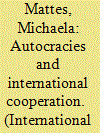

|
|
|
|
|
| Summary/Abstract |
Scholarly work on the impact of domestic politics on international cooperation has grown significantly over time. Unfortunately, there is a democratic bias to much of this literature as scholars typically focus on the relative advantage of democracies at cooperation. Our paper seeks to shed more light on the cooperation potential of autocracies by distinguishing different types of autocratic regimes. We argue that autocracies that more closely resemble democracies in the institutional characteristics that have been found to be important for cooperation (that is, greater leader accountability, limited policy flexibility, and greater transparency) should be more successful at cooperation and thus more likely to cooperate with one another and with democracies. Specifically, we expect single-party and military regimes to be advantaged at international cooperation compared to personalist systems. We test our theoretical expectations using the 10 Million International Dyadic Events data (1990–2004) and find support for our theoretical argument.
|
|
|
|
|
|
|
|
|
|
|
|
|
|
|
|
| 2 |
ID:
157510
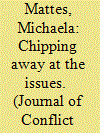

|
|
|
|
|
| Summary/Abstract |
Disputants might resolve their disagreements in a piecemeal fashion, addressing a subset of the issues at a time. How viable is such a strategy? I argue that partial settlements signal the desire to resolve disagreements and can lay the foundation for additional cooperation by building trust and/or demonstrating the benefits of dispute resolution. As a result, partial settlements should be associated with the resolution of remaining disagreements. Yet, scholars have questioned whether pursuing a piecemeal approach may be more harmful than helpful, and a systematic empirical test of these competing predictions is necessary. Using data from worldwide territorial claims between 1919 and 2001, I find a strong positive correlation between partial settlements and comprehensive dispute resolution. In the shorter run, partial settlements are also associated with an increased likelihood for peaceful negotiations, but there is only limited evidence that they reduce conflict before all aspects of the claim are resolved.
|
|
|
|
|
|
|
|
|
|
|
|
|
|
|
|
| 3 |
ID:
112135
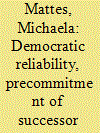

|
|
|
|
|
| Publication |
2012.
|
| Summary/Abstract |
Given frequent leadership turnover and leaders' need to appeal to voters, democracies should face difficulties in maintaining their alliance commitments. Yet the empirical evidence predominantly shows that they do make reliable allies. Democratic governments can increase reliability by binding future administrations through the choice of alliance commitment. While defense pacts precommit future leaders to close military cooperation with an ally, consultation pacts leave more room for discretion. This research note examines when precommitment through a defense pact is likely to occur. A government should be more likely to conclude a defense pact if potential successors have different preferences regarding the alliance, if the government believes that it will lose power soon, and if the costs of precommitment are not too high. I test the theoretical expectations using the Alliance Treaty Obligations and Provisions (ATOP) data between 1945 and 2003. The findings support the argument and suggest an answer to the puzzle of why states sometimes conclude whole-hearted commitments and other times seemingly half-hearted ones.
|
|
|
|
|
|
|
|
|
|
|
|
|
|
|
|
| 4 |
ID:
082466
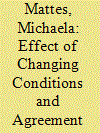

|
|
|
|
|
| Publication |
2008.
|
| Summary/Abstract |
Can agreements that states sign in order to manage competing claims help ensure a durable peace? This article examines the effect of "conciliatory agreements" that include attempts to address differences after significant conflict has occurred, such as peace agreements, as well as agreements designed to manage competing claims before they reach the level of violence. I argue that provisions specified in conciliatory agreements make the existing peaceful equilibrium more robust against the potentially disruptive effect of shocks, such as changes in relative capabilities or regime type. Conciliatory agreements not only increase the likelihood that peace is maintained but also impact the kind of peace maintained. Specifically, competing states may remain at peace either because they retain the status quo or because they peacefully renegotiate. Varying agreement provisions can account for why some states resort to force, while others peacefully renegotiate. I test the propositions concerning the effect of shocks and agreement provisions on the durability of peace and the likelihood of renegotiation using cases of territorial claims
|
|
|
|
|
|
|
|
|
|
|
|
|
|
|
|
| 5 |
ID:
139529


|
|
|
|
|
| Summary/Abstract |
This study examines the effect of domestic political change on United Nations General Assembly (UNGA) voting. We argue that foreign policy change is most likely when a new leader—one who relies on different societal groups for support than her predecessor—comes to power. We then examine the extent that domestic institutional context—in particular, democracy—shapes this process. We test our hypotheses using a new measure of UNGA voting patterns and new data on changes in leaders' supporting coalitions. We find that change in the societal support base of leaders leads to change in UN voting, especially in nondemocracies. This study lends credence to the perspective that foreign policy, like domestic policy, can vary with the particular interests that leaders represent; it encourages scholars to focus less on leadership change per se and more on changes in the societal groups to which leaders are most accountable. This study also suggests that democratic institutions inspire policy consistency not only in areas governed by treaties and international law, but also in areas of foreign policy that are easier to alter in the short term.
|
|
|
|
|
|
|
|
|
|
|
|
|
|
|
|
| 6 |
ID:
144088


|
|
|
|
|
| Summary/Abstract |
This article introduces the CHISOLS (Change in Source of Leader Support) dataset, which identifies which leadership changes within countries bring to power a new leader whose primary support is drawn from different societal groups than those who supported her predecessor. The dataset covers all countries of the world with populations greater than 500,000 from 1919 to 2008. We discuss the underlying rationale of our data collection, provide some brief information about the coding rules and procedures, and share some descriptive statistics. We find that changes in sources of leader support are more common in democracies than non-democracies, but also that changes in sources of leader support often occur without irregular leader transitions or large institutional changes, even within non-democracies. CHISOLS can be productively combined with other datasets like POLITY, Archigos, and DPI that provide information about political institutions, modes of leader transition, and placement on a left–right policy continuum, but CHISOLS also provides something new that was not previously available. These data allow researchers to study the extent to which different types of policy change are associated with all leader transitions, with changes in political institutions, or with changes in the set of interests that leaders most closely represent; CHISOLS facilitates comparing the effect of leaders, interests, and institutions on policy change across a wide spatial temporal domain.
|
|
|
|
|
|
|
|
|
|
|
|
|
|
|
|
| 7 |
ID:
188391
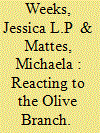

|
|
|
|
|
| Summary/Abstract |
A popular view holds that foreign policy hawks have an advantage at bringing about rapprochement with international adversaries. This idea is rooted in domestic politics: voters respond more favorably to efforts at reconciliation when their own leader has a hawkish rather than a dovish reputation. Yet, domestic reactions are only part of the equation—to succeed, rapprochement must also evoke a favorable response by the adversary. In this research note, we argue that hawks who make conciliatory gestures may face international liabilities that could offset their domestic advantages. Foreign audiences should view doves who make overtures as more sincere and should therefore be more willing to support cooperation with foreign doves than with foreign hawks. We field a pair of survey experiments to examine whether Americans respond differently when foreign hawks versus foreign doves deliver the olive branch. We find that foreign doves fare better at eliciting cooperation because they are deemed more sincere, though the prospect of military vulnerability limits how willing Americans are to respond positively even to a dove who makes a gesture. Thus, while past research has shown that hawks are better positioned domestically to initiate rapprochement, our findings suggest that they have a harder time eliciting a favorable response from the adversary.
|
|
|
|
|
|
|
|
|
|
|
|
|
|
|
|
| 8 |
ID:
115315
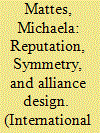

|
|
|
|
|
|
|
|